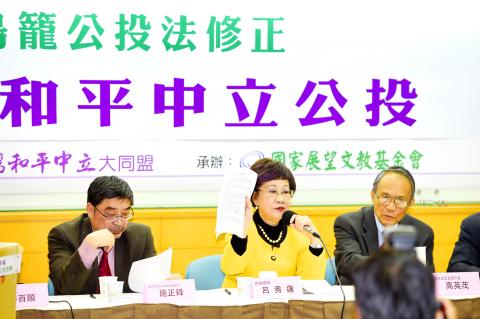The Peace and Neutrality for Taiwan Alliance, led by former vice president Annette Lu (呂秀蓮), yesterday stated its intention to hold a referendum for a neutral Taiwan in tandem with local elections next year, urging President Tsai Ing-wen (蔡英文) to sign and promulgate the amended Referendum Act (公民投票法) as soon as possible.
Lu told a news conference in Taipei that she believes that Taiwan must pursue neutrality and should not “sit idly by and wait for the end to come,” while sandwiched between China and the US.
We must make our own path and with the amendment of the Referendum Act, it is possible for the 23 million people of Taiwan to, with collective public wisdom, formulate the correct sort of public consciousness, Lu said.

Photo: George Tseng, Taipei Times
Our path would be one of peaceful neutrality, to focus on humanitarian efforts, to befriend the US and the Japanese while making peace with the Chinese, Lu said, adding that the ultimate goal is to establish friendly and egalitarian relations with other nations around the globe.
The proposal has more than 20,000 supporting signatures and was drafted in accordance with the original Referendum Act, the alliance said.
With the amendments passed on Tuesday, the proposal has reached the revised threshold.
Under the amended act, the threshold for initiation of a referendum was lowered from 0.005 percent of the electorate in the most recent presidential election — or about 90,000 people — to 0.0001 percent — or about 1,800 — while the second-stage signature threshold was dropped from 5 percent — or 900,000 voters — to 1.5 percent — or about 280,000.
The passing requirement has been amended to a simple majority vote that would see any referendum act passed if supporting votes exceed nay-saying votes and comprise one-quarter — instead of half — of the eligible voting population.
Once Tsai signs the bill, the alliance plans to submit its proposal to the Central Election Commission, Lu said, adding that the plan is to gather 280,000 signatures within six months and hold the referendum alongside next year’s nine-in-one local elections.
Former deputy minister of foreign affairs Michael Kau (高英茂) said that the Chinese “One Belt, One Road” policy and the US “Free and Open Indo-Pacific” policy is a new balance of terror.
The neutrality of Taiwan would not only maintain its safety, but also diffuse tension between the two world powers, a contribution to both Taiwan and the world alike, Kao said.
Former Nantou County commissioner Peng Pai-hsien (彭百顯) said he supports the “neutral Taiwan” concept out of concern that Taiwan’s national identity has been divided by potential resumption of hostilities with China.
In addition, Lu said that she is planning a forum to be held in March on the possibility and effects of Taiwan becoming neutral.
More than 30 experts and academics are to be invited from more than 10 countries, including the US and Japan, Lu said, adding that she is also trying to invite Chinese experts to the forum.

CHAOS: Iranians took to the streets playing celebratory music after reports of Khamenei’s death on Saturday, while mourners also gathered in Tehran yesterday Iranian Supreme Leader Ayatollah Ali Khamenei was killed in a major attack on Iran launched by Israel and the US, throwing the future of the Islamic republic into doubt and raising the risk of regional instability. Iranian state television and the state-run IRNA news agency announced the 86-year-old’s death early yesterday. US President Donald Trump said it gave Iranians their “greatest chance” to “take back” their country. The announcements came after a joint US and Israeli aerial bombardment that targeted Iranian military and governmental sites. Trump said the “heavy and pinpoint bombing” would continue through the week or as long

TRUST: The KMT said it respected the US’ timing and considerations, and hoped it would continue to honor its commitments to helping Taiwan bolster its defenses and deterrence US President Donald Trump is delaying a multibillion-dollar arms sale to Taiwan to ensure his visit to Beijing is successful, a New York Times report said. The weapons sales package has stalled in the US Department of State, the report said, citing US officials it did not identify. The White House has told agencies not to push forward ahead of Trump’s meeting with Chinese President Xi Jinping (習近平), it said. The two last month held a phone call to discuss trade and geopolitical flashpoints ahead of the summit. Xi raised the Taiwan issue and urged the US to handle arms sales to

State-run CPC Corp, Taiwan (CPC, 台灣中油) yesterday said that it had confirmed on Saturday night with its liquefied natural gas (LNG) and crude oil suppliers that shipments are proceeding as scheduled and that domestic supplies remain unaffected. The CPC yesterday announced the gasoline and diesel prices will rise by NT$0.2 and NT$0.4 per liter, respectively, starting Monday, citing Middle East tensions and blizzards in the eastern United States. CPC also iterated it has been reducing the proportion of crude oil imports from the Middle East and diversifying its supply sources in the past few years in response to geopolitical risks, expanding

Pro-democracy media tycoon Jimmy Lai’s (黎智英) fraud conviction and prison sentence were yesterday overturned by a Hong Kong court, in a surprise legal decision that comes soon after Lai was jailed for 20 years on a separate national security charge. Judges Jeremy Poon (潘兆初), Anthea Pang (彭寶琴) and Derek Pang (彭偉昌) said in the judgement that they allowed the appeal from Lai, and another defendant in the case, to proceed, as a lower court judge had “erred.” “The Court of Appeal gave them leave to appeal against their conviction, allowed their appeals, quashed the convictions and set aside the sentences,” the judges